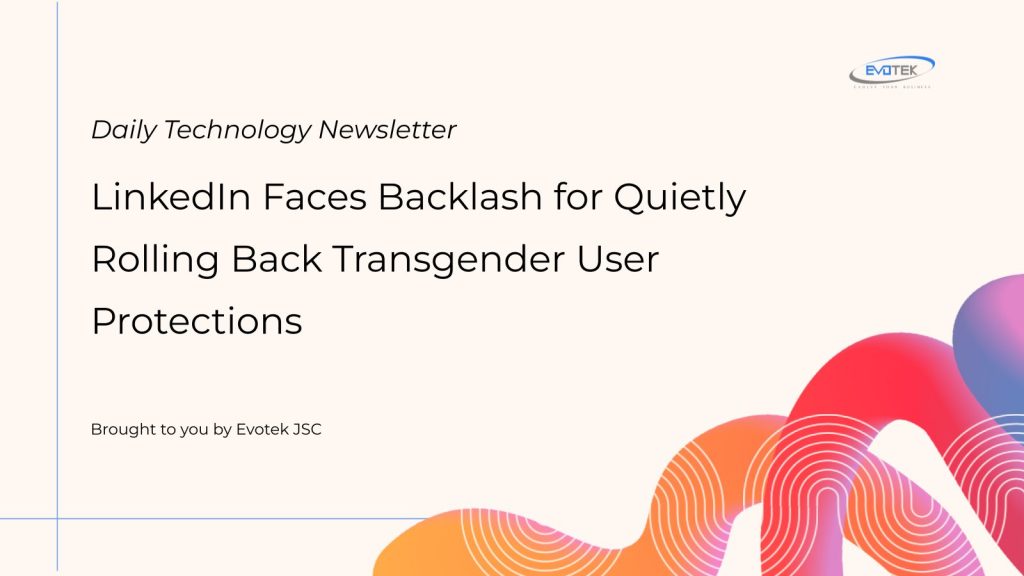Microsoft-owned LinkedIn has reportedly joined a growing list of tech giants quietly revising policies that previously offered explicit safeguards for transgender users. This week, the professional networking platform removed specific prohibitions against deadnaming and misgendering from its hate speech guidelines. The change, initially highlighted by the nonprofit Open Terms Archive, eliminates language that explicitly listed “misgendering or deadnaming of transgender individuals” as prohibited hateful content.
Previously, LinkedIn’s policy on hateful and derogatory content clearly cited misgendering and deadnaming as examples of banned conduct. While the platform still broadly prohibits “content that attacks, denigrates, intimidates, dehumanizes, incites or threatens hatred, violence, prejudicial or discriminatory action,” addressing an individual by a name or gender they do not identify with is no longer explicitly listed as a violation.
Furthermore, LinkedIn also removed “race or gender identity” from its examples of inherent traits in its harassment policy. The qualification for harassment now focuses on behavior that is “disparaging another member’s […] perceived gender,” omitting direct mention of race or gender identity.
Lack of Transparency Fuels Criticism
The move has drawn sharp criticism due to LinkedIn’s lack of transparency. The company made these significant policy revisions without any public announcement or explanation. When questioned by a reporter from The Advocate, LinkedIn provided a generic corporate response, stating, “We regularly update our policies” and asserting that “personal attacks or intimidation toward anyone based on their identity, including misgendering, violates our harassment policy.”
However, critics argue that if existing policies already cover such actions, there is no logical reason to remove explicit protections. This quiet removal, they suggest, makes it more challenging for both users and content moderators to clearly understand what constitutes prohibited behavior. The prevailing view is that LinkedIn is pre-emptively bowing to political pressure, particularly in the current climate of intensifying culture wars.
A Familiar Playbook for Tech Giants
LinkedIn’s actions mirror a pattern observed among other major tech platforms. Earlier this year, Meta revised its policies to permit content that labels LGBTQ+ individuals as “mentally ill” or portrays trans identities as “abnormal.” Similarly, YouTube discreetly removed “gender identity” from its hate speech policies, labeling it as mere “regular copy edits.” This trend suggests a widespread capitulation within the tech industry, often without direct governmental threats.
Many believe these companies are anticipating anti-trans legislative and administrative actions, particularly from a potential Trump administration. By proactively weakening protections, they appear to be attempting to avoid future regulatory scrutiny. However, experts argue this appeasement strategy is unlikely to succeed, as authoritarian demands tend to escalate once a weakness is perceived.
The Real-World Impact of Policy Changes
It is crucial to understand that deadnaming and misgendering are deliberate acts of dehumanization, designed to invalidate transgender individuals’ identities and create hostile environments. When platforms explicitly protect against these behaviors, they signal inclusion and respect for trans users. Conversely, the quiet removal of such explicit protections sends a profoundly negative message: that the platform does not prioritize the humanity and safety of its transgender users.
This decision is particularly concerning for LinkedIn, a professional networking site where individuals should feel secure in presenting their authentic selves. Transgender professionals already face significant discrimination in hiring and workplace environments. LinkedIn’s policy shift risks signaling an environment where harassment is tacitly permitted, further marginalizing an already vulnerable community.
While LinkedIn claims general policies against harassment and hate speech remain, vague guidelines are inherently harder to enforce consistently than specific examples. Removing explicit guidance on anti-trans harassment makes it easier for malicious actors to exploit loopholes and more difficult for moderators to draw clear boundaries.
A Call for Corporate Courage
The timing of these policy changes is alarming, coinciding with a global surge in anti-trans rhetoric and legislation. At a moment when vulnerable communities need stronger safeguards, major tech platforms are instead rolling back existing protections. Despite possessing billions in revenue and vast legal teams, these companies appear to be prioritizing political expediency over user safety and fundamental principles.
This behavior is seen as a display of corporate cowardice, an abandonment of stated values at the first sign of political headwinds. The message conveyed to transgender users is stark: their safety and dignity are secondary to political calculations. This trend from mainstream platforms undermines trust in online spaces and raises concerns about governance based on political opportunism rather than consistent ethical principles.
Critics also highlight the hypocrisy of those who previously decried alleged political pressure on content moderation, yet remain silent now. Ultimately, experts agree that appeasing anti-trans groups is a futile exercise, as demands will only escalate. Instead, tech leaders are urged to uphold their principles and protect their users, regardless of external political pressure.

 日本語
日本語 한국어
한국어 Tiếng Việt
Tiếng Việt 简体中文
简体中文